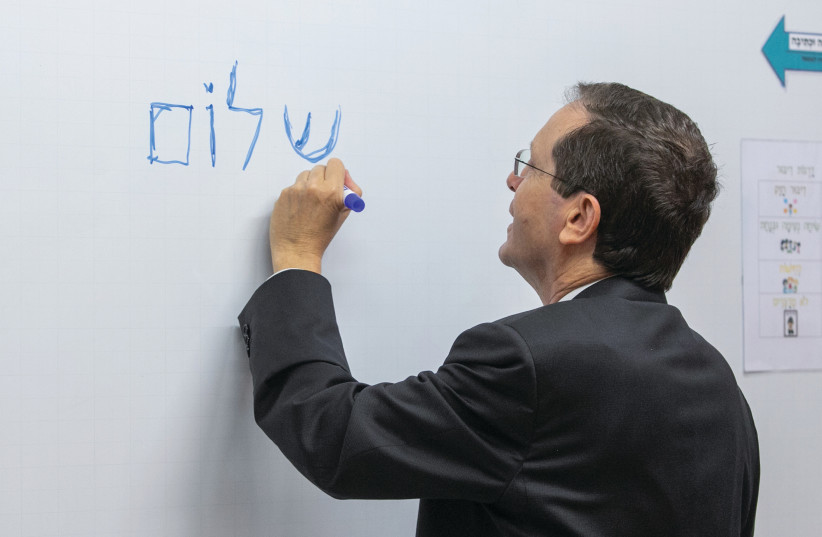President Isaac Herzog and Turkish President Recep Tayyip Erdogan expressed hope for warmer diplomatic ties between their countries, after Israelis jailed for photographing Erdogan’s house returned to Israel on Thursday.
The phone call, as well as another between Prime Minister Naftali Bennett and Erdogan, follows more than a decade of tension between Israel and Turkey.
Herzog thanked Erdogan on the phone “for his personal involvement and contribution” to Natali and Mordy Oaknin’s release.
Erdogan “emphasized the importance that he attaches to relations with Israel, which he said were of key importance to the peace, stability, and security of the Middle East,” Herzog’s spokesman said.
Herzog “welcomed the desire for Turkey and Israel to hold a comprehensive dialogue on bilateral and regional issues related to regional peace.”

The Turkish readout of the call did not mention the Oaknins at all, but was otherwise similar to the Israeli statement.
Erdogan added that “differences of opinion can be minimized if acted upon with mutual understanding in both bilateral and regional issues.”
The Prime Minister’s Office said Bennett thanked Erdogan for his personal involvement in allowing the Oaknins to return home, saying it was a humanitarian matter.
Bennett praised the “efficient and discrete” communication between Israel and Turkey in a time of crisis.
Erdogan’s senior adviser Ibrahim Kalin became involved in the case of the Oaknins, who were arrested as suspected spies after photographing Erdogan’s palace from a television tower in Istanbul
However, after intensive intervention by the foreign minister, the Prime Minister’s Office and Herzog, including calls to Kalin, he ultimately informed Israel’s chargé d’affaires in Turkey, Irit Lillian, that the Oaknins were free to return to Israel.
Throughout the nine-day ordeal, there were concerns that the couple was being held to exact a price of some kind from Israel.
In the end, the Kafkaesque incident was a mistake by local authorities in Istanbul, as one diplomatic source put it, and Israel was not asked to pay a price.
But Erdogan may still end up getting something out of Israel: better relations, despite the Israeli media’s description of the Oaknins’ incarceration as the unjust whim of an autocratic regime, and widespread media calls for Israeli tourists to boycott Turkey.
“Maybe they should have kept them in detention for a few more days, then people will learn not to go to Istanbul,” a barber in Jerusalem’s Mahaneh Yehuda market said on Thursday.
Responded another: “I won’t even fly through Istanbul; we’d probably be arrested.”
Yet Herzog, Prime Minister Naftali Bennett and Foreign Minister Yair Lapid expressed gratitude to Erdogan, and the diplomatic source speculated that the contact between Israeli and Turkish officials could rekindle ties between the countries.
Poor relations between Israel and Turkey go back as far as 2008, when Israel launched Operation Cast Lead against Gaza two days after Erdogan met with then-prime minister Ehud Olmert, embarrassing the Turkish president for looking complicit.
The nadir came in May 2010, when the Erdogan-linked IHH (Humanitarian Relief Foundation) sent the Mavi Marmara ship to bust the IDF’s naval blockade on Gaza, arming some of the people aboard. IDF naval commandos stopped the ship, and when they were attacked by IHH members aboard, killed nine of them.
During the ensuing decade, Israel and Turkey maintained diplomatic relations, even reinstalling ambassadors in 2016. But over the years, Erdogan harbored Hamas terrorists, backed destabilizing activities in east Jerusalem, and accused Israel of intentionally killing Palestinian children.
In 2018, Turkey expelled Israeli Ambassador Eitan Na’eh – now Israel’s envoy to Bahrain – to protest the IDF’s response to Palestinian rioting on the Gaza border, and Israel responded in kind.
Meanwhile, Israel has developed close ties with Greece and Cyprus, Turkey’s historic adversaries, with an emphasis on energy and defense ties. Israel, Greece and Cyprus have worked on developing natural gas fields, and the warships of Turkey, which controls Northern Cyprus, have warned Israeli ships away from Cypriot waters.
Turkey has claimed parts of Greece’s exclusive economic zone, and Israel issued a rare statement taking Greece’s side in the dispute.
But Erdogan has made overtures toward Israel more recently, which could be a way for Turkey to get in on the natural gas developments in the region, or a bridge to repair bad relations between the Turkish president and US President Joe Biden.
In an interview with The New York Times last year, Biden called Erdogan an “autocrat” who “has to pay a price.”
Last December, Erdogan was reported to have chosen Ufuk Ulutas, 40, a pro-Palestinian academic who studied at Hebrew University, to be his ambassador to Israel, though he never presented credentials in Jerusalem.
Soon after, Erdogan said in a news conference that “our heart desires that we can move our relations with [Israel] to a better point,” and that intelligence sharing has always been intact, but that “we have some difficulties with the people at the top,” and Ankara “cannot accept the attitude of Israel toward the Palestinian lands.”
The government’s effusive expressions of gratitude to Erdogan and a 40-minute precedent-setting call with Herzog in July – promoting a “comprehensive dialogue” between the countries – indicates that despite popular anger in Israel at Turkey over the Oaknin affair, it could end up bringing the countries closer.
